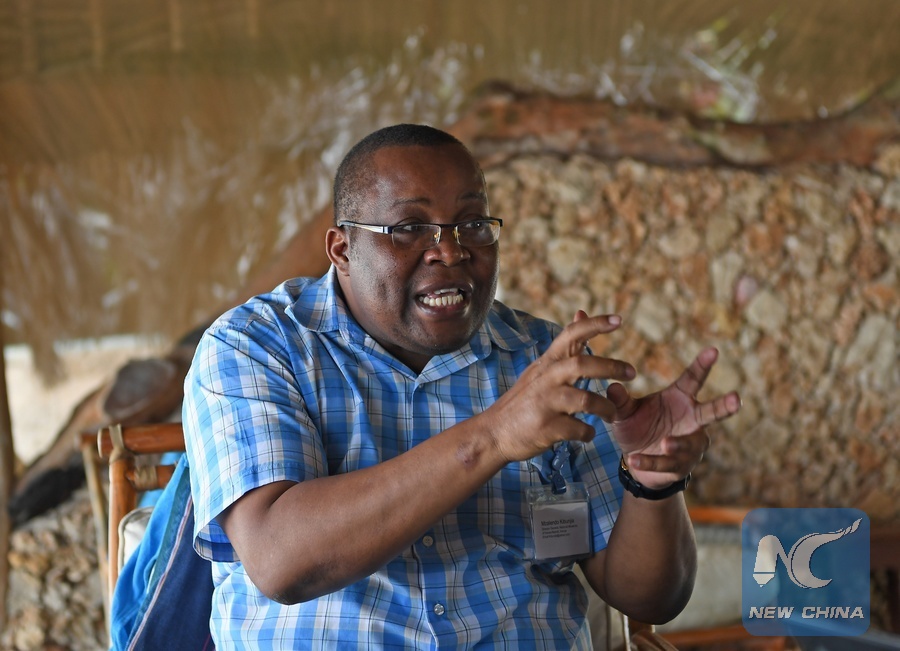
Mzalendo Kibunjia, Director-General of the National Museums of Kenya, receives an exclusive interview with Xinhua in Lamu, Kenya, on July 28, 2017. More people should learn about the long time connection between China and Africa, said Kibunjia during the interview with Xinhua on the sidelines of the first "Ancient and Contemporary Relations Between China and East Africa" conference, which opened in Lamu in Kenya on Friday. (Xinhua/Chen Cheng)
by Xinhua writers Wang Xiaopeng and Lu Duobao
LAMU, Kenya, July 30 (Xinhua) -- More people should learn about the long time connection between China and Africa, said Mzalendo Kibunjia, Director-General of the National Museums of Kenya, while receiving an exclusive interview with Xinhua on the sidelines of the first "Ancient and Contemporary Relations Between China and East Africa" conference, which opened in Lamu in Kenya on Friday.
The remarks came after Chap Kusimba, a professor with American University, announced at the event that a team consisting of archaeologists from the United States, China and Kenya has excavated skeletons of 3 people determined to be with Chinese blood on Manda Island in Lamu County of Kenya. Kusimba said it marked the first time such relics were found in East Africa.
According to the joint team, the excavation work, which began on the island in December 2012, also revealed other relics, including the ruins of an ancient town and Chinese beads and coins.
Kibunjia hailed the discovery as "very important." "What these excavations are showing is that the connection between China and East Africa is much longer than we imagined," he said.
The analysis by the archaeologists estimated that one of the skeletons might be determined to be at the same period as the time when Chinese navigator Zheng He travelled to East Africa in the 15th century. The other two people are determined to be living in a period after the admiral's expeditionary voyages.
"Chinese connection with Kenya was not a one-time event," Kibunjia said, adding that the connection was not a chance but was something that was consistent.
According to Kibunjia, there are thousands of artifacts associated with China that are stored in Kenyan facilities, including porcelain. He said that most of them are stored in museums in Lamu, Malindi, and Mombasa, which are located along the coast.
"Our stores are full of materials associated with Chinese trade," he said, adding that the materials were found both on land and underwater.
"This is something I laugh when people say China is beginning to get interested in Africa," he said. "China has been interested in Africa for a long time."
Kibunjia, who once pursued study in the United States, believed China and Africa have been friends for a long time and the connection has nothing to do with colonization. "Chinese came and traded with us," he said. "Chinese now come and bring development with us."
Kibunjia had visited Haikou, capital city of Hainan Province in southern China, and Beijing, and he was impressed by China's long history and its facilities to store cultural relics.
Commenting on the bilateral cooperation on cultural protection, which has already been enhanced in recent years, he said he hoped that China will help Kenya train more young technicians so that the cultural relics in the country will be better taken care of.
According to some archaeologists who presented discoveries at the 3-day conference, those people whose skeletons were found in Manda island might have come to East Africa through land trade routes or the Maritime Silk Road. They believe that the excavation of these relics have provided valuable resources for the study on the exchanges between China and East Africa in ancient times.

